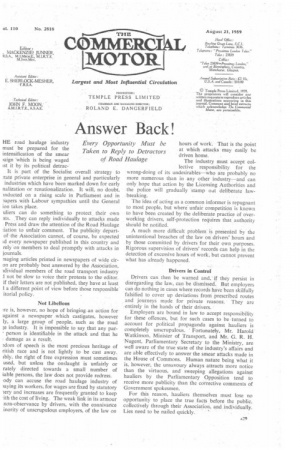Answer Back!
Page 31

If you've noticed an error in this article please click here to report it so we can fix it.
HE road haulage industry must be prepared for the intensification of the smear laign 'which is being waged ist it by its political detracIt is part of the Socialist overall strategy to rate private enterprise in general and particularly industries which have been marked down for early nalization or renationalization. It will, no doubt, inducted on a rising scale in Parliament and in )apers with Labour sympathies until the General ion takes place.
uliers can do something to protect their own sts. They can reply individually to attacks made Press and draw the attention of the Road Haulage iation to unfair comment. The publicity departof -the Association cannot, of course, be expected id every newspaper published in this country and rely on members to deal promptly with attacks in journals.
naging articles printed in newspapers of wide ciron are probably best answered by the Association, idividual members of the road transport industry I not be slow to voice their protests to the editor. if their letters are not published, they have at least I a different point of view before those responsible. itorial policy.
Not Libellous :re is, however, no hope of bringing an action for against a newspaper which castigates, however ly, a large group of people, such as the road ;e industry. It is impossible to say that any par person is identifiable in the attack and that he , damage as a result.
tdom of speech is the most precious heritage of ritish race and is not lightly to be cast away. tbly, the right of free expression must sometimes used, but unless the onslaught is unfairly or rately directed towards a small number of iable persons, the law does not provide redress. ody can accuse the road haulage industry of iaying its workers, for wages are fixed by statutory iery and increases are frequently granted to keep ith the cost of tying. The weak link in its armour non-observance by drivers, with the connivance inority of unscrupulous employers, of the law on hours of work. That is the point at which attacks may easily be driven home.
The industry must accept collective responsibility for the wrong-doing of its undesirables—who are probably no more numerous than in any other industry—and can only hope that action by the Licensing Authorities and the police will gradually 'stamp out deliberate law, breaking.
The idea of acting as a common informer is repugnant to most people, but where unfair competition is known to have been created by the deliberate practice of overworking drivers, self-protection requires that authority should be notified.
A much more difficult problem is presented by the unintentional breaches of the law on drivers' hours and by those committed by drivers for their own purposes. Rigorous supervision of drivers' records can help in the detection of excessive hours of work, but cannot prevent what has already happened.
Drivers in Control Drivers can then be warned and, if they persist in disregarding the law, can be dismissed. But employers can do nothing in cases where records have been skilfully falsified to cover up deviations from prescribed routes and journeys made for private reasons. They are entirely in the hands of their drivers, Employers are bound in law to accept responsibility for these offences, but for such cases to be ,turned to account for political propaganda against hauliers is completely unscrupulous. Fortunately, Mr. Harold Watkinson, Minister of Transport, and Mr. G. R. H. Nugent, Parliamentary Secretary to the Ministry, are well aware of the true state of the industry's affairs and are able effectively to answer the smear attacks made in the House of Commons. Human nature being what it is, however, the unsavoury always attracts more notice than the virtuous, and sweeping allegations against hauliers by the Parliamentary Opposition tend to receive more publicity than the corrective comments of Government spokesmen.
For this reason, hauliers themselves must lose no opportunity to place the true facts before the public, collectively through their Association, and individually. Lies need to be nailed quickly. •




































































































